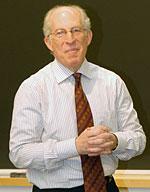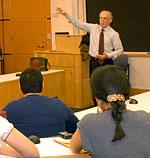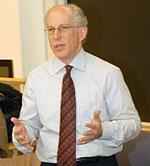Prof. Liebman On Accountability in NYC Public Schools
Prof. Liebman, who took a part-time leave from the Law School to fill the position, is building on his work during the 1980s on school desegregation law. As a young public interest lawyer, he viewed desegregation as the best solution for what ails U.S. schools, but he now espouses a different strategy.
“It became clear to me that reform in the educational area, and really in all other public activities—whether it’s environmental or child welfare or school desegregation—requires thinking about organizational structure more than individual rights,” he said. “You need to figure out ways to influence people who structure public activity, and although courts can structure public activity, it’s more directly structured by the people who are running those activities.”
Prof. Liebman, who served as assistant counsel at the NAACP Legal Defense and Educational Fund from 1979-85, recommends that public interest lawyers think more like corporate lawyers.
“If you’re a corporate lawyer putting together a deal, and you want to protect certain interests in that deal, you want to create different centers of gravity within the organization you’re building that will enable you to get the outcomes that you want,” he said.
Prof. Liebman believes that the special interest politics that dominate discourse has impeded progress in New York public schools, despite years of attempted reform.
“We need to suspend politics and focus on what we agree the problem is. As long as we can solve part of the problem, we ought to do that.”
To achieve this goal of incremental progress, the Department of Education is empowering schools so that principals, local administrators, and teachers can act on its behalf, without approval from the city. Balancing this unprecedented autonomy is Prof. Liebman’s accountability system. Schools are no longer being judged on the levels of student scores, but on the progress students make from their baseline level upon entering. This way, an impoverished school whose students are making incremental progress will score higher than an elite school with higher overall grades, but whose students are not demonstrating progress in reading, math, and science. Schools that show progress will be rewarded with funding and incentives. Schools that fall below a certain measure will lose some autonomy or have their principal replaced, and if a school proves itself incapable of succeeding, “We’ll close the school and open another one,” said Prof. Liebman.In order to tell if a school is succeeding, the system compares “likes to likes.” If a large school in a poor neighborhood with particular kind of student population is able to raise its scores a bit, a similarly sized school in a similar neighborhood with a corresponding student population will be expected to make the same bit of progress.
“When you say, we’re going to hold you to the best that other schools like you can do, all of a sudden, [there are] no more excuses,” he added.
Prof. Liebman, who joined the Columbia Law School faculty in 1985, is now setting his sights on initiatives to persuade school principals to make the current tenure model more exclusive. He is also pushing for equal funding for all public schools. While he traces his drive to the revolutionary ideals of the 1960s, experience has left him with a clear-eyed pragmatism.To achieve real reform, he concluded, “You want to be as close to the ground as possible. If you came to Columbia to make a difference, look to the nooks and crannies of state and local government.”


